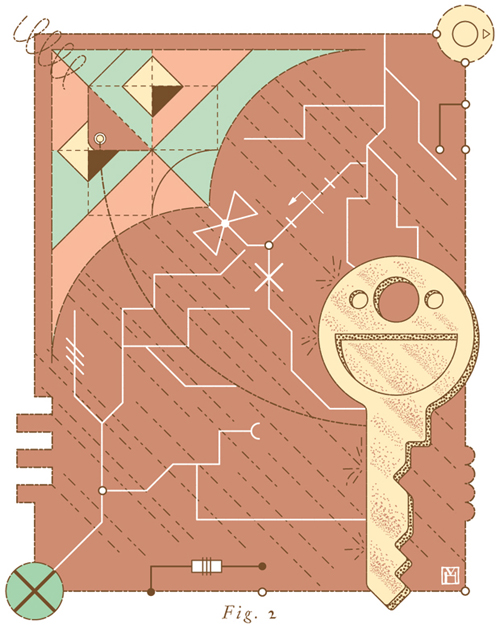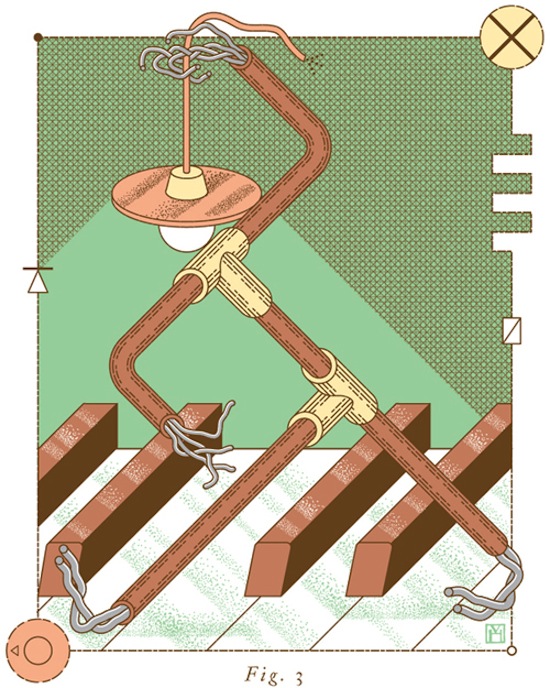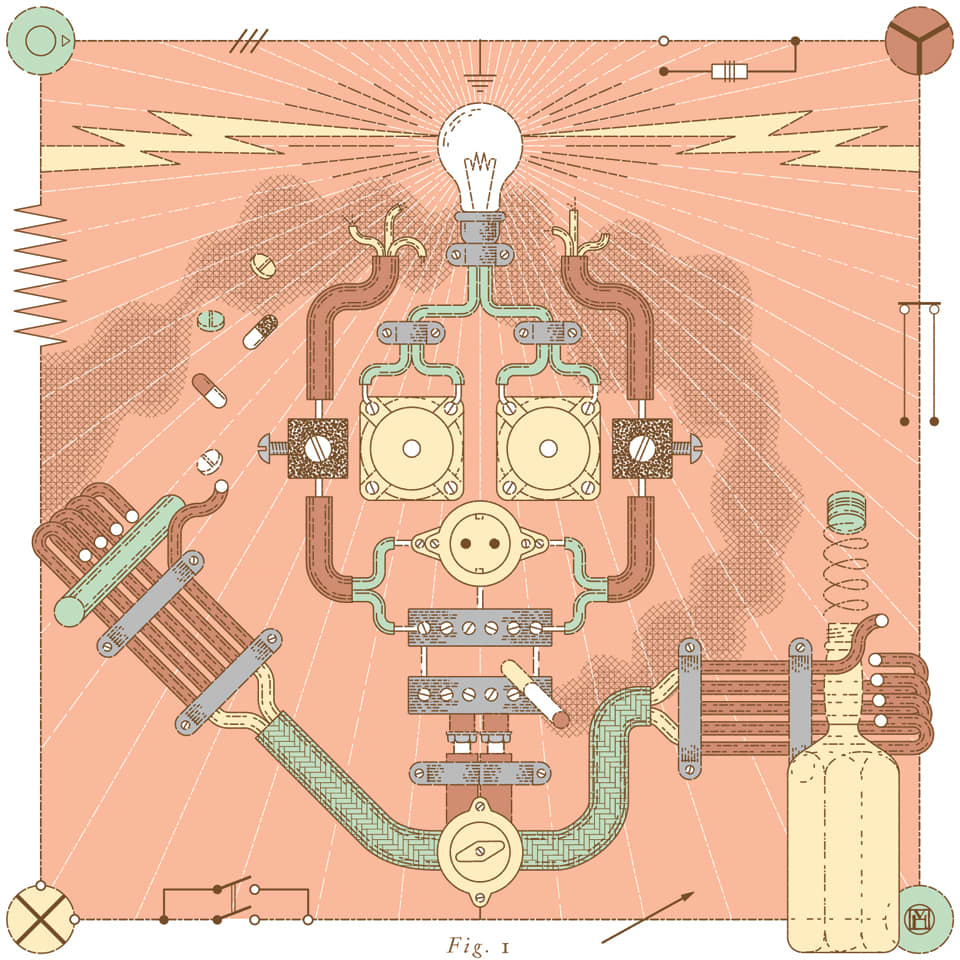Whether it’s psychedelic drugs, Bowie or Burt Reynolds, musicians are influenced and inspired by the world at large. We talked to seven artists about their greatest musical lessons—things they’ve learned either through experience or from just being fans—and how they’ve internalized those ideas in their own music today.
UPCOMING RELEASE: The Seer out now on Young God
FORMATIVE INFLUENCES: Mothers of Invention and psychedelic drugs.
I did acid 300 times before I turned 14. Not that I’m recommending this. I actively don’t recommend it, but I had no parental supervision and an adolescence that was riddled with psychedelics. Psychedelics are the release of your ego and barriers, so you can get fully immersed in something. I was born in 1954, so I was kind of a young hippie but ripe for the time. I recall listening to the Mothers of Invention when they first came out, and I guess I would have been 12, but on acid nevertheless. Mothers of Invention were, to me, what music could be. It was just like creating a total world that you could get completely lost in. And I did get lost in it. It wasn’t really like a series of pop songs, or like nowadays, just grabbing something from iTunes. It was really kind of a total experience, a world you could live in. It was a baptism. It wasn’t the first time—I had a similar experience even younger when I first heard Burl Ives reading Br’er Rabbit, a Walt Disney record—but it definitely changed me, like a baptism. The Doors were another huge thing. I remember sniffing gasoline listening to the first Doors album. No one had ever heard anything like any of this! And ever since then, with Swans, I’m still, to this day, trying to make something that you can completely lose yourself in like that. I make these sounds so that I can get lost, almost selfishly, and the audience seems to come along and enjoy it. I guess I’ve just always been a wanderer, even when I was 12. People interpret Swans as being aggressive or something, but I look at it more as a really kind of positive experience, trying to reach something bigger than yourself. I’m always just reaching to heaven with sound.

UPCOMING RELEASE: Castles Around My Heart out 2013 on Mad Decent
FORMATIVE INFLUENCES: Grimace, metaphysics and Magnum PI.
When I was five, my mom was pushing me around in a Care Bears stroller that she bought at a garage sale. We loaded it into her peach, partially rusty 1983 Mercury Topaz with no AC. The dingy cloth seats smelled like a cigarette getting ashed into a Zima bottle on the last day of Lollapalooza. While she rushed me from the car on this Saturday morning at 10:17AM, she wouldn’t let me get back into the stroller. She wiped it down with an old oil rag from the trunk and a half-used Windex bottle that she diluted with water from the » side of someone’s house. The metal seat belt was scalding hot, but I didn’t mind. I was anxious to go to the mall and possibly get a Happy Meal later that night like she promised, so that I could get the Grimace roller-racing car that was in the Happy Meal. I already had the Hamburglar Hot Wheels car from last week’s adventure. She pushed me to the mall where she immediately went to a customer service rep at Sears and demanded store credit, if not a full refund for the stroller, even though she didn’t have a receipt. She was sure to get a gift card where she could make a purchase downstairs, and could come back later that afternoon to get a full-cash refund from the previous receipt that she had conjured. Just like last week. At the age of five, my mind was already processing everything that the world was about. We walked back to the car. She was happy. I was happy and wanted to go buy something at the mall, but we didn’t have any money. Just then a black sleek limo passed us and parked in the front of the building. I was intrigued and mystified. My day was locked in on this golden moment. Flawless, breathtaking ladies helped someone from the back seat. Two blonde, one brunette, all tan with neon wristbands. A tall guy wearing a Bud-weiser T-shirt stepped out of the back seat with Magnum PI glasses on. My mom grabbed my arm, clenching her nails into my skin through my shirt. “Jody, that’s Burt Reynolds,” she said. I had no idea who he was, but I knew that I wouldn’t forget this moment. As they walked inside, I could remember thinking, “I bet he never has to ask anyone for a Happy Meal.” Through time this story makes me sad and motivated. Thinking that there are multiple worlds inside this one single planet. He is I, I am him. Rap game Burt Reynolds.
Upcoming Release: Sunburn, a solo EP, out now on Greco-Roman
Formative Influences: “A New Career in a New Town” by David Bowie, realizing that the possibility of making an impact is greater than the fear of failure.
When Vampire Weekend first came out, there was so much positive and good [written about the band] but also, there was a lot of negative press. In the context of playing in a group, it didn’t really bother me too much, but in the context of wanting to do my own thing, I was kind of scared of having to deal with that. More recently, though, I was thinking about the way that I interact with music and having a positive reaction versus having a negative reaction. If you really think about it, having a negative reaction to music is really fleeting. You listen to something, you decide you don’t like it, you turn it off and you go on to something else, whereas a positive reaction to a piece of music is something that can stay with you for your entire life. When you sort of weigh the two possible reactions, there’s really no reason not to put yourself out there.
One piece of music that I know will stay with me for the rest of my life is the song “A New Career in a New Town” off of David Bowie’s record Low. Everything about it, from the title to the sound, really resonates with me: the idea of hopeful melancholy; that often, in going to this new place and having this new life, there’s also a little bit of sadness. To have a new career in a new town means you’re leaving behind an old career in an old town. I can only guess what Bowie was thinking when he gave it that title, but it’s something that resonated pretty deeply with me when I was 19 years old and will resonate deeply with me for the rest of my life. If he’d never made that piece of music that would not be the case. I know that I’ll never be able to make something that resonates with someone else in that way unless I actually make something, and that’s an important thing to recognize.
UPCOMING RELEASE: Will Happiness Find Me? out now on Not Not Fun
FORMATIVE RELEASE: Sound waves and college.
Before I got into making music, I was mainly concerned with certain moods and sensations that a song could evoke in me. Let’s call it the psychosomatic approach, the emphasis being on “somatic,” or the healing aspects of music. Also, sound waves have always made the best vehicle for time traveling. When I started college, I was very into the sociological and cultural aspects of past youth subcultures, and music was the key to another time and place, to the youthful energy that never fades. I have always totally over-mystified musicians, too. But when I became an artist, I suddenly realized that not all creators of divine harmonies are nice people, and also that there are way too many formal and technical aspects to music that I had never thought about. I started hearing different things. One thing that has remained the same though is my belief that the most important thing in music is the simplest thing, the loop, or the human voice. Just a little something to remind us that we are all here and now—that the cycles of life are never-ending, ever-self-reiterating. As New Age-y as that might sound, music is about affirmation of all times, the past, the present and the future.
UPCOMING RELEASE: Fin Remixes Pt. 1 out August 2012 on Permanent Vacation
FORMATIVE INFLUENCES: The Barcelona club scene and copying other people.
I didn’t have a mentor. In my case, it was more like self-knowledge. In Spain we don’t have older electronic artists. Everything is unexplored, a little bit do it yourself. For me, the most important thing has been the club scene in Barcelona. I’ve been going to clubs since I was 17, and when I went out, I always brought a notebook to write down the tracks I liked. Back then, there was no Discogs as we know it today, and I couldn’t look up strange tracks on YouTube. Digital stores didn’t exist. The only thing I could do was discover tracks in the clubs, ask DJs the names of the artists and try to find them on eBay. Sometimes you only had one chance to hear a song, and if you didn’t get those names, you’d never hear it again.
I didn’t have turntables at home, so I had to go to my friend’s house. We went there some afternoons and played for hours. The decks were really bad quality, and it was difficult to beat-match the records, so I worked at Häagen-Dazs for a whole summer to save up to buy a pair of Technics. It wasn’t easy to get equipment, and it was quite expensive. Plus, we didn’t have older people to recommend specific things. We knew that there were drum machines, and we knew that there were samplers, but we didn’t know anyone in Spain who was selling them. Everything you needed, you had to do it in English through eBay. When you don’t know anything about producing, copying other people is a really good way to learn techniques and develop your skills. We just started copying electro tracks we liked, or tried to reproduce an Aphex Twin rhythm. I suppose my tastes are peculiar, and they’re based in Balearic melodies, but I feel it more from the inside than from my surroundings. People always tell me my music has something in common with Barcelona, so it must be true.

UPCOMING RELEASE: Dream On out fall 2012 on Planet Mu
FORMATIVE INFLUENCES: Henry Rollins.
However much I enjoyed music as a kid growing up in Washington DC, it never crossed my mind to actually try playing it. When I was 12 or 13, my parents rented an acoustic guitar for me, but it seemed completely disconnected from the post-grunge alterna-sprawl that was in heavy rotation on DC101 and I treated it like a chore. Pretty quickly it was returned to the shop. A little while later, I nabbed an electric Yamaha and a Crate amp crucially equipped with distortion, and would just hang out strumming all the strings open, not making any chords, ’cause it at least sounded kinda like Marilyn Manson. But still, there was never any thought of actually becoming a musician; the only musicians I was aware of were these rock stars singing about crippling heroin addiction and fucking you like an animal, and I definitely did not know anything about that. But then I stumbled on a copy of Henry Rollins’ book Get in the Van, his tour diaries from the Black Flag years, and there was this one part where he wrote about an early UK tour where the punkers drenched the band in spit and one woman threw a cup of piss on him from the balcony and it was like, Oh shit! This is exactly what I want to be doing with my life! Somehow playing a dive bar in the soggy UK winter drenched in urine felt more real, exciting and (duh) possible than the overplayed sexndrugsnrocknroll myth, and the next day I started to enlist friends for a band. Thankfully the punks have calmed down and I’m keeping pretty dry, but I did get soaked at a rainy outdoor show in Moscow last week where a nitrous dealer pulled a knife on my tourmates and told them he’d “cut [their] fucking hearts out” before asking for “that DJ from DC,” so I guess dreams do come true in their own way.
UPCOMING RELEASE: Grace & Lies out now on No Quarter Records
FORMATIVE INFLUENCES: Homemade skateboards and rap music..
It was the late ’80s and I went to this place called Active Sports. It was a surf shop or something. They had used skateboards there, which was odd. They were really expensive, so you could re-sell them and it was a little bit cheaper to buy than a new one. I remember picking out a skateboard where some kid had sanded off the graphics and redrawn his own with permanent marker. It was some monsters or something. I remember thinking, Wow, it’s so cool that you don’t have to have the brand name on there, that you can re-appropriate this thing to be your own. That was kind of an awakening. I listened to mainly rap at that age, and [that skate-board] awakened the idea that with my Casio I could make rap music. It changed the idea to participating as opposed to being a fan. I can alter things or I can make my own. That set the difference in my mind between being a maker and a participator. That set up my whole music life, and I never really deviated.

